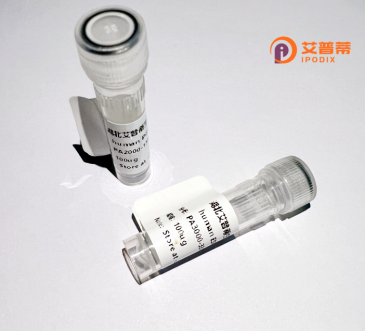
| 纯度 | >90%SDS-PAGE. |
| 种属 | Human |
| 靶点 | AZI2 |
| Uniprot No | Q9H6S1 |
| 内毒素 | < 0.01EU/μg |
| 表达宿主 | E.coli |
| 表达区间 | 1-392aa |
| 氨基酸序列 | MDALVEDDIC ILNHEKAHKR DTVTPVSIYS GDESVASHFA LVTAYEDIKK RLKDSEKENS LLKKRIRFLE EKLIARFEEE TSSVGREQVN KAYHAYREVC IDRDNLKSKL DKMNKDNSES LKVLNEQLQS KEVELLQLRT EVETQQVMRN LNPPSSNWEV EKLSCDLKIH GLEQELELMR KECSDLKIEL QKAKQTDPYQ EDNLKSRDLQ KLSISSDNMQ HAYWELKREM SNLHLVTQVQ AELLRKLKTS TAIKKACAPV GCSEDLGRDS TKLHLMNFTA TYTRHPPLLP NGKALCHTTS SPLPGDVKVL SEKAILQSWT DNERSIPNDG TCFQEHSSYG RNSLEDNSWV FPSPPKSSET AFGETKTKTL PLPNLPPLHY LDQHNQNCLY KN |
| 分子量 | 71.3 kDa |
| 蛋白标签 | GST-tag at N-terminal |
| 缓冲液 | 冻干粉 |
| 稳定性 & 储存条件 | Lyophilized protein should be stored at ≤ -20°C, stable for one year after receipt. Reconstituted protein solution can be stored at 2-8°C for 2-7 days. Aliquots of reconstituted samples are stable at ≤ -20°C for 3 months. |
| 复溶 | Always centrifuge tubes before opening.Do not mix by vortex or pipetting. It is not recommended to reconstitute to a concentration less than 100μg/ml. Dissolve the lyophilized protein in distilled water. Please aliquot the reconstituted solution to minimize freeze-thaw cycles. |
以下是关于AZI2的3篇代表性文献摘要概述:
---
1. **文献名称**:AZI2 regulates TBK1 activation through a non-canonical signaling pathway in antiviral innate immunity
**作者**:Gack MU et al.
**摘要**:该研究揭示AZI2通过结合TANK-binding kinase 1(TBK1)促进其激活,在病毒RNA诱导的先天免疫应答中起关键作用。AZI2通过其N端结构域与TBK1结合,增强干扰素调节因子3(IRF3)的磷酸化,从而触发I型干扰素产生。
---
2. **文献名称**:AZI2/NAP1 modulates mitochondrial antiviral signaling and IRF3 activation
**作者**:Chen W et al.
**摘要**:研究表明,AZI2作为线粒体抗病毒信号复合体(MAVS)的辅助因子,参与RIG-I样受体(RLR)通路。敲低AZI2会削弱MAVS与TBK1的相互作用,抑制病毒诱导的IRF3激活,提示其在抗RNA病毒免疫中的必需性。
---
3. **文献名称**:AZI2 promotes cGAS-STING signaling and tumor cell proliferation in breast cancer
**作者**:Yang L et al.
**摘要**:该研究发现AZI2在乳腺癌中高表达,通过稳定cGAS-STING信号通路促进肿瘤细胞增殖和免疫逃逸。机制上,AZI2与cGAS相互作用并抑制其泛素化降解,增强胞质DNA感知通路的活性。
---
**备注**:若需具体全文或出版信息,可基于上述标题在PubMed/Google Scholar进一步检索。实际研究中建议结合最新文献补充数据。
AZI2 (5-Azacytidine Induced Protein 2), also known as NAP1 (Nuclear Autoantigenic Sperm Protein 1) or TBKBP2. is a multifunctional adaptor protein encoded by the AZI2 gene. Initially identified as a gene upregulated by the DNA demethylating agent 5-azacytidine, AZI2 is implicated in innate immune signaling pathways, particularly those involving antiviral responses. It interacts with key kinases such as TANK-binding kinase 1 (TBK1) and IκB kinase ε (IKKε), facilitating their activation to regulate interferon production and NF-κB signaling. Structurally, AZI2 contains a conserved TRAF-binding motif and a ubiquitin-binding domain (UBAN), enabling its role in protein-protein interactions and signalosome assembly.
AZI2 participates in RIG-I-like receptor (RLR) and Toll-like receptor (TLR) pathways, bridging cytosolic sensors to downstream effectors. Studies highlight its importance in promoting type I interferon responses during viral infections, including hepatitis C and SARS-CoV-2. Dysregulation of AZI2 has been linked to autoimmune disorders, chronic inflammation, and cancer, reflecting its dual role in immune homeostasis and oncogenesis. Additionally, AZI2 may influence cell cycle progression and apoptosis, though these mechanisms remain less characterized. Its interplay with homologous proteins like AZI1 (NAP2) underscores functional redundancy within immune regulatory networks. Overall, AZI2 serves as a critical node integrating epigenetic, immune, and stress-responsive signals, with ongoing research exploring its therapeutic potential in infectious and inflammatory diseases.
×